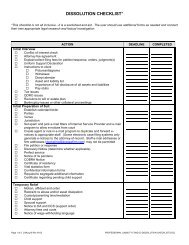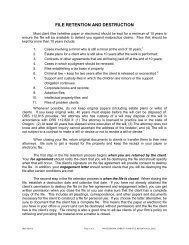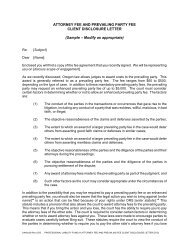The Oregon Inheritance Tax and Its Fractional Formula
The Oregon Inheritance Tax and Its Fractional Formula
The Oregon Inheritance Tax and Its Fractional Formula
- No tags were found...
Create successful ePaper yourself
Turn your PDF publications into a flip-book with our unique Google optimized e-Paper software.
<strong>The</strong> <strong>Oregon</strong> <strong>Inheritance</strong> <strong>Tax</strong> <strong>and</strong> <strong>Its</strong> <strong>Fractional</strong> <strong>Formula</strong>By Philip N. Jones, Duffy Kekel LLP<strong>The</strong> <strong>Oregon</strong> inheritance tax applies to both residents <strong>and</strong> nonresidents, but in differentways. In both cases, however, the <strong>Oregon</strong> inheritance tax statutes employ a fractionalformula that can produce surprising results. Particularly surprising is the fact that anonresident with only a small amount of <strong>Oregon</strong> assets will still be subject to <strong>Oregon</strong> tax.Equally surprising is the fact that a nonresident could leave all of his or her <strong>Oregon</strong> assetsto a surviving spouse or to a charity, <strong>and</strong> <strong>Oregon</strong> tax might still be due. All of this iscaused by the fractional formula. Attorneys with clients who move to other states (suchas clients who retire to southern California) will want to familiarize themselves with the<strong>Oregon</strong> fractional formula <strong>and</strong> the odd results it creates.<strong>Oregon</strong> taxes resident decedents on (1) tangible personal property located in <strong>Oregon</strong>, (2)real property located in <strong>Oregon</strong>, <strong>and</strong> (3) all intangible property regardless of situs. But thetax is calculated on the entire taxable estate (wherever located), <strong>and</strong> then the tax ismultiplied by a fraction, the numerator of which is the sum of the three classificationsdescribed above, <strong>and</strong> the denominator is the entire gross estate. ORS 118.010(3).Nonresident decedents are taxed on property located in <strong>Oregon</strong>, including tangiblepersonal property <strong>and</strong> real property. Nonresidents are also taxed on intangibles located in<strong>Oregon</strong>, unless the state of domicile grants reciprocity (an exemption for intangiblesowned by nonresident decedents). But the tax is calculated on the entire taxable estate(wherever located), <strong>and</strong> then the tax is multiplied by a fraction, the numerator of which isthe value of the assets subject to tax in <strong>Oregon</strong>, <strong>and</strong> the denominator is the entire grossestate. ORS 118.010(4).A recent article discussed the factors that will be taken into account to determine whetheror not the decedent was an <strong>Oregon</strong> resident. Stephen J. Klarquist, Determining <strong>Oregon</strong>Residency for State <strong>Inheritance</strong> <strong>Tax</strong> Purposes, Or Estate Plan & Admin Sec Newsl, Oct.2009, at 5.In short, under the <strong>Oregon</strong> statutory scheme tangible property (both real <strong>and</strong> personal)will be taxed only by the state in which it is located, in both resident <strong>and</strong> nonresidentestates. Intangible personal property held by resident estates will be taxed regardless oflocation, <strong>and</strong> intangible personal property held by nonresident estates will be taxed onlyif it is located in <strong>Oregon</strong> <strong>and</strong> the resident state does not grant a reciprocal exemption.ORS 118.010; OAR 150.118-010(3), (4)(b). As discussed below, the definition ofintangible personal property is extremely broad, at least according to the regulations.OAR 150-118.010(1)(2), (3).<strong>The</strong>se statutes can produce some unexpected results, partly because the filing threshold of$1,000,000 is based on the gross estate, regardless of where the assets of the gross estateare located. ORS 118.160(1)(b)(D). As a result, a nonresident with a gross estate of$1,000,000 or more, but with a small amount of <strong>Oregon</strong> assets, will be required to file an
<strong>Oregon</strong> inheritance tax return, <strong>and</strong> will be required to pay <strong>Oregon</strong> inheritance tax if thetaxable estate exceeds $1,000,000, even if the state of residence imposes no estate orinheritance tax.For example, if an <strong>Oregon</strong> resident moves to California (which has no estate orinheritance tax), but leaves behind in <strong>Oregon</strong> real property, tangible personal property, or(more likely) intangible personal property (such as an <strong>Oregon</strong> bank account), thatperson‟s estate will be subject to <strong>Oregon</strong> inheritance tax if the taxable estate (whereverlocated) exceeds $1,000,000.<strong>The</strong> same result will take place if the person never lived in<strong>Oregon</strong>, but happens to own real or personal (tangible or intangible) property in <strong>Oregon</strong>.Because of the fractional method of calculating the tax, even a small amount of <strong>Oregon</strong>property will trigger a tax.<strong>The</strong> same result will take place if the person lived in Washington, except Washington hasits own estate tax, <strong>and</strong> <strong>Oregon</strong> exempts the intangible personal property of Washingtonresidents because Washington grants a reciprocal exemption for intangible personalproperty of <strong>Oregon</strong> residents. RCW 83.100.040; WAC 458-57-125. As a result, an<strong>Oregon</strong> tax will be due from a Washington resident estate if the estate holds <strong>Oregon</strong> realproperty or tangible personal property located in <strong>Oregon</strong>, even if the value of the <strong>Oregon</strong>property is small.A reciprocal exemption for intangible property does not exist between <strong>Oregon</strong> <strong>and</strong>California. California has no estate or inheritance tax, <strong>and</strong> the <strong>Oregon</strong> regulations providethat the exemption exists in <strong>Oregon</strong> only if the foreign state imposes an estate orinheritance tax <strong>and</strong> exempts the intangible personal property of <strong>Oregon</strong> residents. OAR150-118.010(4)(b); Cal Rev & <strong>Tax</strong> Code § 13,302.If all of the <strong>Oregon</strong> property of a nonresident passes to a surviving spouse or to a charity,the <strong>Oregon</strong> inheritance tax on nonresidents is not necessarily eliminated. Maritaldeductions <strong>and</strong> charitable deductions, like all other deductions, reduce the taxable estate,not the gross estate, <strong>and</strong> the fractional formula employs the gross estate as itsdenominator <strong>and</strong> the gross estate located in <strong>Oregon</strong> as its numerator. <strong>The</strong> fact that someor all of the numerator passes to a spouse or to a charity does not affect the fraction or theresulting percentage. Marital deductions <strong>and</strong> charitable deductions will reduce the overall<strong>Oregon</strong> tax, but they will not reduce the percentage of the tax payable to <strong>Oregon</strong>, nor willthey reduce the assets (the gross estate) to be measured against the filing threshold. As aresult, the amount of tax payable to <strong>Oregon</strong> will remain the same regardless of whetherthe assets passing to the spouse or to a charity consist of <strong>Oregon</strong> assets or foreign assets.As mentioned above, the <strong>Oregon</strong> Department of Revenue has adopted a very broaddefinition of intangible personal property located in <strong>Oregon</strong>. <strong>The</strong> statute variously refersto such property as “within the jurisdiction of the state” or “located in <strong>Oregon</strong>.” ORS118.010(1), (4). <strong>The</strong> regulations adopt the position that property within the jurisdiction ofthe state includes (for example) stock in an <strong>Oregon</strong> corporation, accounts in <strong>Oregon</strong>banks, <strong>and</strong> promissory notes given by an <strong>Oregon</strong> resident. OAR 150-118.010(1)(2). <strong>The</strong>regulations also define “intangible personal property” as including “stocks, bonds, notes,
currency, bank deposits, accounts receivable, patents, trademarks, copyrights, royalties,goodwill, partnership interests, life insurance policies, <strong>and</strong> other choices [sic] in action.”OAR 150-118.010(1)(3).<strong>The</strong> ambiguous drafting of the statute <strong>and</strong> the regulations raises many questions. Why doORS 118.010(1) <strong>and</strong> ORS 118.010(4)(a) both refer to “property within the jurisdiction ofthe state,” while the fractional formula in ORS 118.010(4)(a) includes only property“located in <strong>Oregon</strong>,” particularly when the regulations at OAR 150-118.010(1)(2)specifically state that “within the jurisdiction of the state” is broader than “„within thestate‟ which denotes locality”? And it seems hard to believe that a court would allow<strong>Oregon</strong> to tax stock in an <strong>Oregon</strong> publicly traded corporation held by the estate of anonresident, as suggested by OAR 150-118.010(1)(2)(a).Keep in mind, however, that no <strong>Oregon</strong> inheritance tax return will be due (<strong>and</strong> no tax willbe due) if the worldwide gross estate of the decedent is less than the <strong>Oregon</strong> filingthreshold of $1,000,000. ORS 118.160(1)(b)(D).<strong>The</strong> bottom line: nonresident clients with even a small amount of <strong>Oregon</strong> assets shouldreview their situation in order to determine whether steps should be taken to minimize oreliminate the <strong>Oregon</strong> inheritance tax. Those steps might include disposing of <strong>Oregon</strong>assets or moving the <strong>Oregon</strong> assets to another state, such as the state of residence,depending on the inheritance tax laws of the state of residence. Even <strong>Oregon</strong> residentscan reduce their <strong>Oregon</strong> inheritance tax by holding tangible assets in other states, but theamount of overall tax savings will depend on the inheritance tax laws of the other states.This article was originally published in the <strong>Oregon</strong> Estate Planning <strong>and</strong> AdministrationSection Newsletter, Vol. 27, No. 2, April 2010. This article is posted with permission.
















